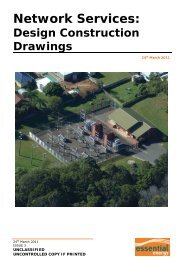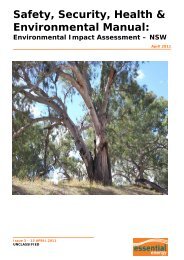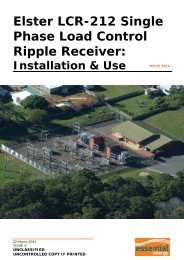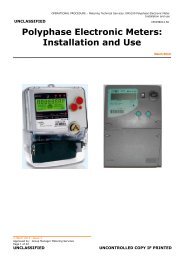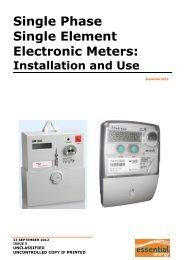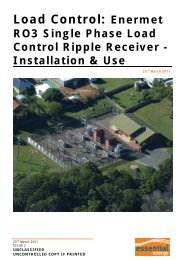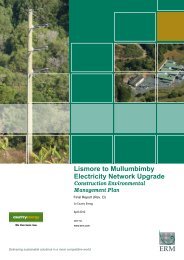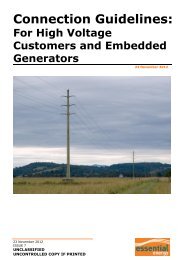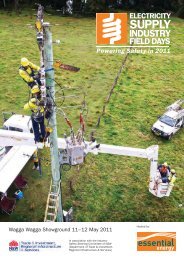Full Version - Essential Energy
Full Version - Essential Energy
Full Version - Essential Energy
Create successful ePaper yourself
Turn your PDF publications into a flip-book with our unique Google optimized e-Paper software.
Notes to the Financial Statements<br />
for the year ended 30 June 2005<br />
NOTE 1. SIGNIFICANT ACCOUNTING POLICIES<br />
The significant policies which have been adopted in the preparation of the financial statements are:<br />
(a) Reporting Entity<br />
Country <strong>Energy</strong> was formed on 1 July 2001 by the merger of three NSW electricity distributors. These distributors traded as<br />
Advance <strong>Energy</strong>, Great Southern <strong>Energy</strong> and NorthPower.<br />
Country <strong>Energy</strong> is incorporated under the State Owned Corporations Act 1989. Country <strong>Energy</strong>’s capital comprises two (2)<br />
fully paid $1.00 ordinary shares issued to the Minister for Finance and another Minister, currently the Special Minister of<br />
State and Assistant Treasurer. The $2.00 share capital has been included in the amount of contributed equity disclosed in the<br />
Statement of Financial Position (refer note 19).<br />
(b) Financial Reporting Framework<br />
The accompanying statements are a general purpose financial report which has been prepared in accordance with the<br />
requirements of the Public Finance and Audit Act 1983, the Public Finance and Audit Regulation 2000 and the State Owned<br />
Corporations Act 1989. The financial statements have been prepared on an accrual accounting, going concern basis in<br />
accordance with these Acts and Regulation, and are in conformity with Australian Accounting Standards, other authoritative<br />
pronouncements of the Australian Accounting Standards Board and Urgent Issues Group Consensus Views.<br />
69<br />
The financial statements have been prepared in accordance with the historical cost convention and do not take account of<br />
changes in the general purchasing power of the dollar except where stated.<br />
Comparatives have been reclassified where necessary to enhance comparability in respect of changes in the current year.<br />
Where prior year information was not disclosed, or where it is not practical to calculate the information, comparatives have<br />
been omitted. Where this has occurred, references have been made accordingly throughout the financial statements.<br />
Figures have been reclassified this year to incorporate changes required by new or revised accounting standards.<br />
(c) Principles of Consolidation<br />
The consolidated financial statements of the economic entity include the financial statements of the Corporation, being the<br />
parent entity, and its controlled entities. Details of holdings in controlled entities appear in note 27.<br />
The balances and effects of transactions with the controlled entities included in the financial statements have been eliminated.<br />
The controlled entities are EMMLINK Pty Limited, NorthPower <strong>Energy</strong> Services Pty Limited and Country <strong>Energy</strong> Gas Pty<br />
Limited. In the prior year controlled entities included EastCoast Gas Pty Ltd. This entity was deregistered during the previous<br />
year.<br />
NorthPower <strong>Energy</strong> Services Pty Limited did not operate during the year.<br />
(d) Change in Accounting Policies<br />
The accounting policies are consistent with those applied in the previous year.<br />
(e) Impacts of Adopting Australian Equivalents to International Financial Reporting Standards<br />
Country <strong>Energy</strong> will apply the Australian Equivalents to International Financial Reporting Standards (AEIFRS) from the reporting<br />
period beginning 1 July 2005.<br />
(i) Managing the transition<br />
The strategy to manage the transition to AEIFRS includes the following key components.<br />
• Consultants have analysed the standards and Urgent Issues Group Abstracts to identify key areas regarding policies,<br />
procedures, systems and financial impacts affected by the transition<br />
• The differences between AGAAP and AEIFRS have been identified<br />
• A project plan was prepared and is being followed to resolve these differences and assist with the transition.<br />
• The Audit and Risk Committee is overseeing the transition. The Group General Manager, Finance and Business Development<br />
is responsible for the project and reports regularly to the Committee on progress against the plan.<br />
• The plan identifies the steps required to design and implement the necessary processes, procedures and policies to<br />
achieve transition.<br />
COUNTRY ENERGY ANNUAL REPORT 2004–2005



